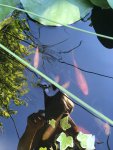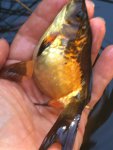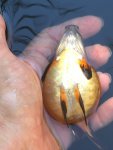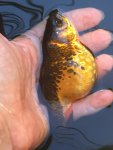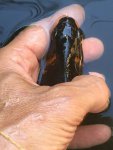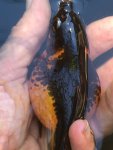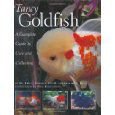I am finding this thread some 5 years after the original post, and I was so impressed with it that I had to sign up and comment. I was looking for information on conditions other than dropsy that could explain one of our fish’s absurdly round belly.
She has been that way for well over a year, albeit it does seem to grow very gradually, and, like the OP’s mother’s goldfish, she is normal in all other respects. She is also the only fish among the total population with this issue. I did isolate her and treat with Epsom salts some months ago, but it didn’t help, she didn’t worsen over that period, and I coming to the same conclusions as WB (really appreciated your contributions), I returned her to the pond, where she carried on swimmingly (*groan*). I decided to keep a watch on her. Like Meg (your posts were so wonderful, and I am sorry for your heartache, outside the fact that your ability to make an attachment to such a creature is the first wondefulness), I figured I’d be contemplating humane options for euthanasia (thank you to a variety of posters for the suggestion of anesthesia and the name, as well as the clove oil suggestion).
Yesterday, I returned after 2 weeks away, and my husband said he thought she looked a little rounder and seemed to turn on herself. I don’t see the latter, but I decided to take a look online again. Egg impaction, tumor, fluid issues... swim bladder... and what else, eventually? I have cured a goldfish of dropsy, and given that the same treatment didn’t help in this case, and that the eyes and scales are normal, I got curious again. Also, clearly not contagious. In nearly 20 years, we have only had 3 “sick” fish in a population of some 40 fish, so conditions are not the problem. I will also add that we have no filtration system, no pump, only plants and water in an old fountain basin. The size and number of the goldfish is determined by the pond. Frogs have come to live there, a heron feeds in them (we have “lost” some favorites), and even a water snake called it home and “our” frogs his or her source of alimentation. I have saved more than one.
I’d like to thank Dave for the book recommendations. Do they provide information on how to help expluse any impacted eggs? We have males, but whoever knows. My husband is an ob/gyn, specializing in infertility and medically assisted pregnancy, but he honestly has no idea how to remove eggs from a fish.
If I come up with nothing, I will also open her after she dies and post.
This being said, can anyone tell me what becomes of fish who die of natural causes in a fish pond that is not so vast that I’d never see them? I have only once seen a dead fish, and my sick one that didn’t make it died in isolation. Other than that, we have had fish who have been with us since before I arrived 16 years ago, and a rotation, given some disappearances (some of which I attribute to the heron) and new babies every year. For some reason, the frogs are far lower in number, and I no longer see tadpoles.
Thanks, and cheers!
PS: She is even finally turning a lovely gold.
